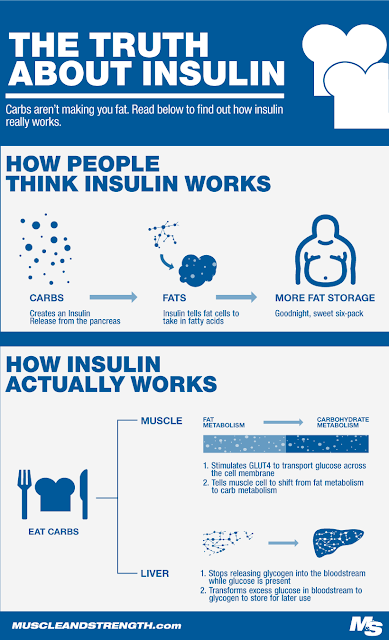Is the insulin spike from ingesting carbohydrates the reason for fat gain? Read this article for everything you need to know about how insulin works!
Broscientist: “Hey man, you gotta go low carb to get shredded”
Friend of Broscientist: “Why is that?”
Broscientist: “Because carbs cause an insulin spike and insulin tells your body to store fat. If you go low carb your body will just burn fat all the time and you will get super lean. I mean I haven’t had a carb in 2 years and look how lean and jacked I am” (*Raises shirt to reveal a blurry 2 pack*).
Friend of Broscientist: “Shoot, better stop eating my oatmeal for breakfast if I want to get abs”.
Conversations like these are heard in gyms, locker rooms, and college campuses across America. Every time one of these conversations takes place gains are lost and a scientist cringes.
The notion that low carb diets are the key to getting lean and that carbs are what cause fat gain is based on an argument that goes as follows: dietary carbohydrates cause an insulin response; insulin can tell fat cells to store fat; therefore dietary carbohydrates cause fat storage.
WHERE DID THIS CARB/INSULIN MYTH COME FROM?
Common reading literature such as Good Calories, Bad Calories have put the hormonal regulation of body fat into limelight. In books such as GCBC, insulin is painted as the primary cause of common obesity. While it is true that hormones play a critical part in the regulation of body-fat, it is naïve to single out insulin as the sole contributor.
Why is it naïve? Well for one our endocrine system is extremely robust with almost countless signaling molecules. While insulin plays a critical part in substrate partitioning and metabolism (including the fate of fat and carbohydrates), it plays only one part in the signaling cascade.
To really understand whether the carbohydrate controls body fat idea holds up, we have to put our lab coats and nerd glasses on (I wear both every day).
INSULIN IN ACTION: MUSCLE, LIVER, AND ADIPOSE TISSUE
First we need to talk a little bit about insulin and what it actually does. Insulin is an endocrine hormone, meaning it affects multiple tissues in the body, not just fat and muscle tissue.
While most of us think about insulin as the hormone that shoves fat and glucose into our muscle cells, that is not insulin’s primary job (meaning as levels of insulin rise what happens at lower levels occurs before higher levels).
Well first, insulin acts in the liver to reduce hepatic glucose output, meaning when you eat something that causes an insulin response it tells your body, “Yo, I got sugar coming in so you don’t need to make anymore, liver you can chill out for a while”. It will also tell the liver to take extra glucose coming in and store it for later as glycogen.
INSULIN AND YOUR MUSCLES
Now we can get to the action of insulin on your muscles. When skeletal muscle is “exposed” to insulin several things happen within the muscle cell. First, glucose transporters (e.g. GLUT4) move to the cell surface and begin transporting glucose into the muscle cell. Secondly, insulin signals the muscle cell to shift to carbohydrate-based metabolism.
Think about insulin like a conductor, when it is gone your body will use more fat for fuel, but when it is present it tells your body to use the extra carbohydrates coming in as fuel.
Now it is important to note that the energy status of the cell plays a role in exactly what happens in the muscle cell. If the muscle cell is low on glucose and/or muscle glycogen the insulin signal will instruct the cell to utilize the incoming glucose for fuel and to begin creating muscle glycogen from any spare glucose.
Now, here is something else most people don’t realize, insulin will cause an uptake of fatty acids into muscle cells to be used for energy later. If the muscle cell is already full of glucose and glycogen and topped off with intramuscular triglycerides, then insulin signaling will do all of the things it does in a low energy state.
It will also turn excess glucose into fat through de novo lipogenesis. De novo lipogenesis from carbohydrates is actually quite “hard” to induce in humans.1,2,3,4
INSULIN AND FAT TISSUE
Insulin does in fact decrease the rate of fat breakdown in fat tissue and does stimulate fatty acid synthesis. The science is crystal clear on this.
Now, you are probably thinking, “Bro, I told you at the start insulin stores fat”. Unfortunately, that is the wrong wording for it. Insulin is “fat-sparing”, not fat promoting.
Yes, insulin does reduce fat oxidation in the short term (when insulin is elevated to a higher level). However, for insulin to have a profound effect on body fatness and fat gain, we would have to have a constant high signal of insulin. That would require being constantly in a fed state.
Our bodies default metabolic state is one of fat oxidation and insulin is simply the switch that turns on carbohydrate metabolism. The net effect of insulin is simply a switch in substrate metabolism, it does not produce a large fat gaining effect due to dietary composition alone.
For insulin to have a significant obesegenic effect in a healthy individual, it must occur in the presence of excess energy.
WHAT ABOUT THE RESEARCH?
If insulin were the key hormone responsible for fat gain than we would expect people who consume more carbohydrates as a percent of their diet to have a higher percentage of body fat than those who consume less.
To prove this point scientifically, let’s look at studies that address the following question: do isocaloric diets that result in higher insulin levels increase body fatness?
One study had 8 participants consume a high-carbohydrate diet (60% CHO) for 7 days and a high-fat diet (60% fat) for 7 days and measured total energy expenditure and nutrient oxidation.
The study showed that the composition of the diet did not effect total energy expenditure (a key component to long-term weight gain) but DID “rapidly shift substrate oxidation to closely reflect the composition of the diet” 1.
Related: 10 Unusual Carbohydrates You’ve Probably Never Eaten
Recently, a study exploring diets that contained 70% carbohydrates showed that it was possible to lose weight and improve insulin sensitivity. That alone should cast some doubt in your mind2.
Another study, conducted by Dr. Kevin Hall, showed that calorie for calorie, fat restriction leads to greater weight loss than carbohydrate restriction over short periods3. This suggests that insulin signaling plays a major role in determining whether fat or carbohydrates are used as a primary fuel source, but not a major role in overall energy expenditure.
Additionally, if insulin were the driving factor in body fatness we would expect virtually all overweight or obese individuals to have elevated insulin levels to cause weight gain. Such is not always the case. In fact, there is a large portion of overweight individuals with normal, “healthy” insulin signaling4. This again points to insulin not being a primary component of body fat regulation
WHAT ABOUT PROTEIN AND INSULIN?
We should also point to one critical piece of evidence, protein also elicits an insulin response. In fact, some high-protein foods elicit a greater insulin response than high-carbohydrate foods (has your brain exploded yet? I know mine did when I first read these articles)5,6.
Why is this important? Well the most consistent finding from nutritional research is that diets higher in protein are effective in reducing body-fatness. Whey protein specifically has been shown to elicit large insulin responses yet it has been repeatedly shown to help reduce body fat in wide ranges of populations.
So if insulin were the main culprit in body-fatness than consuming protein would also encourage fat accumulation and not fat loss.
THE FINAL SAY
When we take all this information, we can draw the conclusion that insulin is a substrate regulator. It switches your body from burning mostly fat to mostly carbohydrate, promotes glycogen synthesis, and protein synthesis if necessary.
In a metabolically healthy individual, the metabolism is flexible and robust enough to handle fluctuations in substrate and maintain leanness even in the presence of a high-carbohydrate intake. Only in the presence of excess energy does insulin truly promote a fat-accumulating environment, even then our body has a nifty way of attempting to attenuate that environment.






TMS for Obsessive Compulsive Disorder is cleared by the U.S. Food and Drug Administration (FDA) for the treatment of major depressive disorder in adults who have failed to achieve satisfactory improvement from prior antidepressant medication treatment.
ReplyDelete